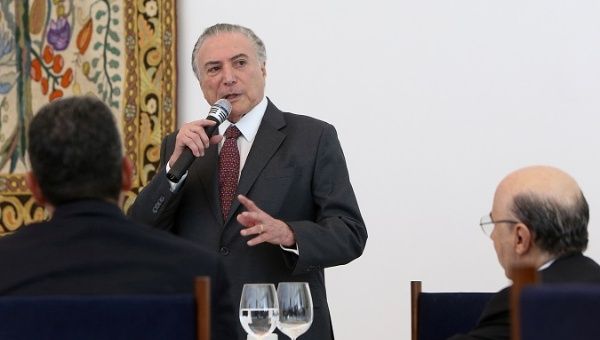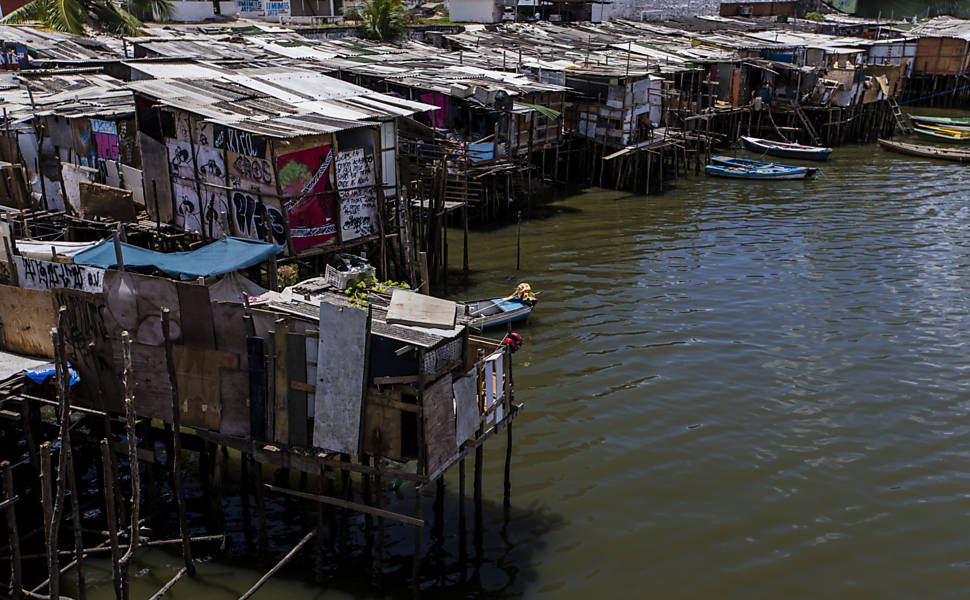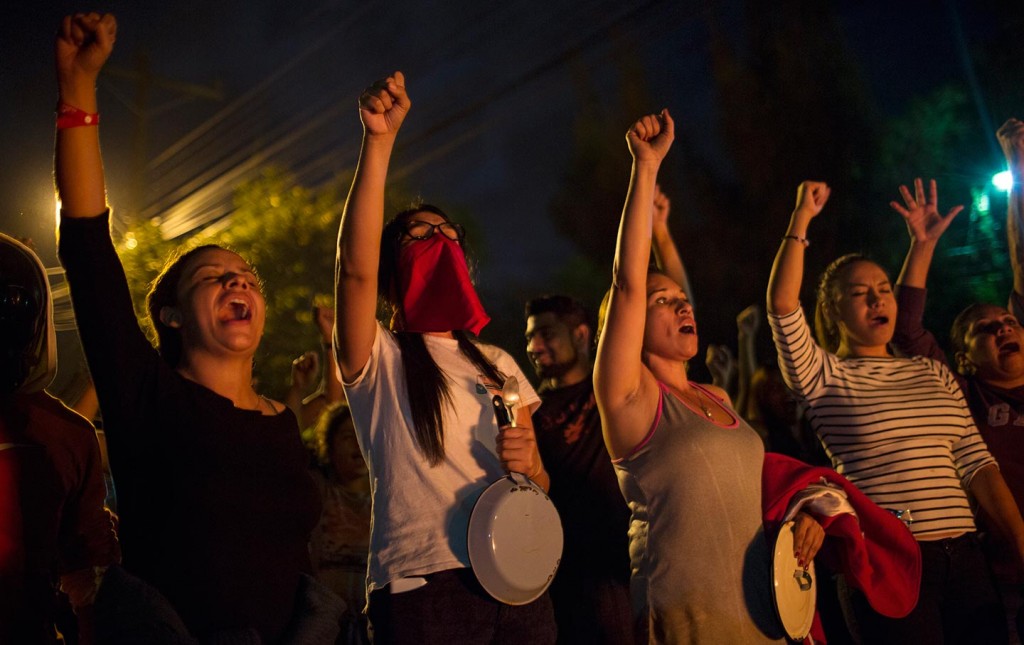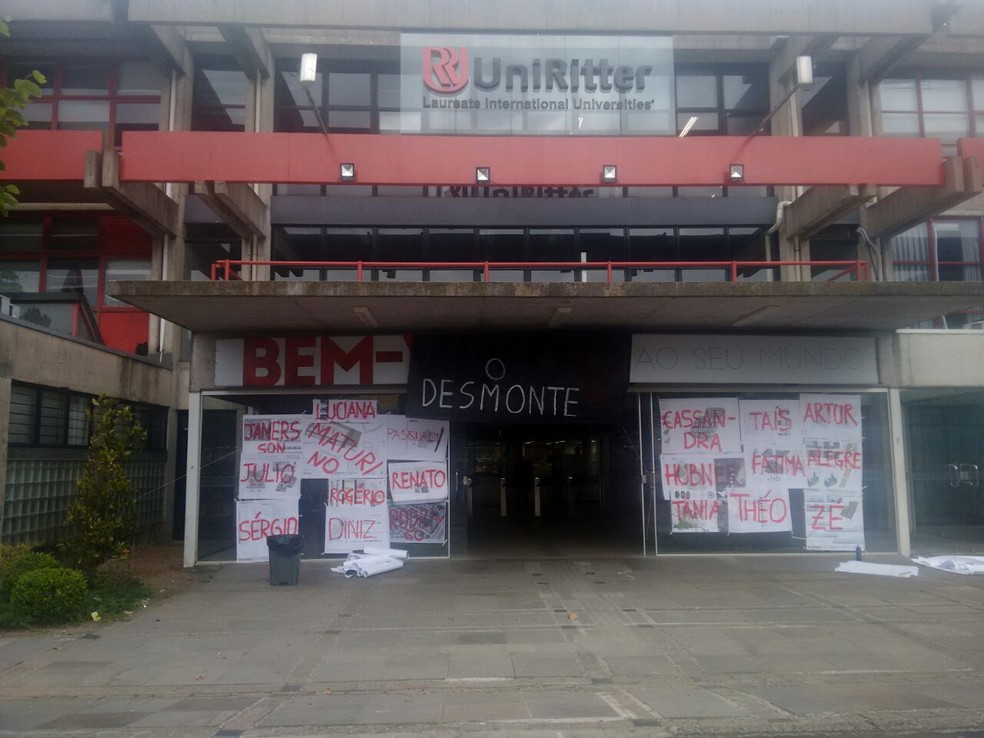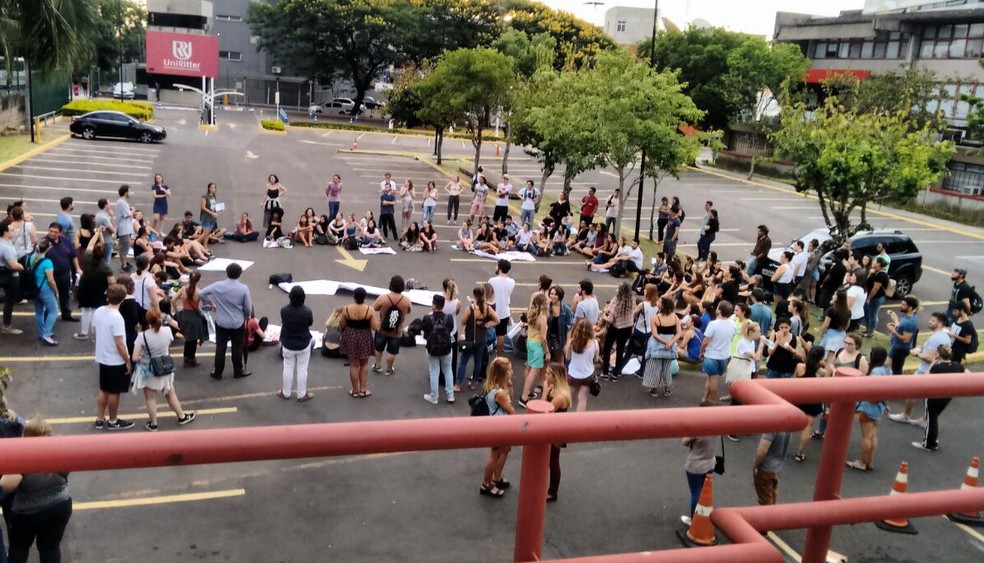Djamila Ribeiro: The fight against racism & sexism in Post-Coup Brasil
Djamila Ribeiro, 37, is currently one of the most popular writers and public figures in the Afro-Brazilian woman’s rights movement. She was born into a working class family in the gritty port city of Santos to communist parents. Her father was active in the local longshoreman’s union and used to take her to the Soviet Union-Brazil cultural center for chess lessons. By the age of 8 she was already winning chess tournaments. She went on to study political philosophy at UNIFESP, one of the best universities in Brazil and is currently working towards a doctorate. During 2016 she was appointed sub-secretary of Human Rights for the City of São Paulo by Mayor Fernando Haddad (PT) and she currently has a blog following on sites like Mulheres Negras, numbering in the hundreds of thousands. She recently wrote the introduction for the Brazilian edition of Angela Davis’ seminal work, Women, Race & Class. Her new book, Nos, Madelenas: uma palavra pelo feminismo (We Magdalenes: a word for feminism) will be released this December and promises to be a best seller. Since she is an outspoken critic of racism in the Brazilian media, Al Jazeera interviewed her for their recent episode of The Listening Post entitled Media, Monopolies and Political Manipulations. I worked as a producer on that program and Al Jazeera was kind enough to provide Brasil Wire with the full interview transcripts, which are reproduced in edited form below.
– Brian Mier
Why do you think that so many people continue to ignore all of the statistical proof of structural racism in Brazil and deny that it’s a problem in this country?
For a long time in Brazil we were sold on this idea of the “racial democracy” – that racism only existed in countries that were legally segregated under apartheid, like the USA and South Africa, as if we were not living under apartheid in Brazil. When you arrive at the peripheries in Brazil and you look at the people, you will see that the colour of poverty is black. But this narrative was pushed for a long time and the media has played a fundamental role in that – racism is both structural and structuring, it’s in all institutional spaces, including the media which for a long time collaborated in creating this discourse. If we look at the mainstream outlets today, including the more progressive ones, there are hardly any black people present in these spaces. If you turn on the TV in Brazil there are hardly any black actors or presenters, hardly any black journalists – this is across all of the channels. We don’t get onto the mainstream channels and not just in front of the camera but behind it too. There aren’t black directors or screenwriters, so there are only a very, very small number of black people in the industry, unfortunately, given the size of the black population in Brazil – and that criticism has to be extended to the progressive outlets in Brazil too, because they are also very white, and they do not take on the racial debate. For a very long time in Brazil, no one has wanted to face this issue, instead saying that we are a mixed country, romanticizing the issue. We’re a mixed country but police bullets have a target, and they’re killing black bodies. The invisibility of black people in spaces of power is glaring, whether that’s in academia or political or institutional spaces, so I think it’s necessary for Brazil to face the problem that it is an extremely racist country, given that the majority of the population is black and we do not manage to reach the spaces of power in this country.
Can you talk a bit about what has Brazil done, historically, to strengthen institutional racism?
There’s was an official whitening policy in Brazil. The initiative that brought European immigrants here during the process of industrialization after the abolition of slavery in 1888 was an official policy. They gave incentives for European immigration here in order to whiten the population, because they believed that within 200 years there would be no more blacks in Brazil. So there was, in fact, a policy for this, but we are still resisting and we’re still here in this country which still denies its African origins and which still runs on the idea that the whiter the better. So there is this ideology in Brazil, to whiten the population. This miscegenation, which is so praised with in Brazil and which is sold abroad, is a romantic idea that started off as the systematic rape of enslaved, black women. This continued with the arrival of European immigrants here. So in Brazil this is a very prevalent issue, Afro-Brazilian identity and its roots are not valued and the media has a fundamental role in this because it also follows this ideology up to today – even the fact that we are not seen, or when we are seen it’s not the kind of representation we want, it’s the kind of representation that is very stereotypical and still, when we discuss, for example, the need for quotas in the media for example, there’s a whole furore of accusations that we want to introduce some kind of ideology. ”Ah, you’re being racist because you are forcing us to hire black people” – we still have these kinds of discussions in Brasil. We have affirmative action in federal universities now and some state level public universities are starting to adhere to racial and class quotas but when we hold these discussions in public or in the media there is always that reaction that tries to invert the logic and accuse us of being racist -all this, in a country where we are not represented positively. I think that this has to be understood as violence. I think that invisibility has to be understood as a kind of violence. I grew up as a black child in this country. I used to turn the TV on and I didn’t see myself there – in my time the biggest kids’ TV presenter was a blonde woman who was assisted by lots of other blonde woman, who was Xuxa, right, so there were 4 generations of “paquitas” as we call them, blonde-haired TV presenters. What did this do to our self-esteem? Because we turned on the television and we saw that the biggest children’s star of the era was blonde, all her assistants were blonde. What is the message that was transmitted to us? That we, as black children, could not be “paquitas”, that the white girls, even if they weren’t blonde, could still dye their hair blonde and they could still be paquitas. It was transmitted to us, to the black girls, that this space was not for us. And when people talk about this, they don’t want to talk about how serious this is, in fact, because this is a kind of violence. The fact is that we do not even manage to feel represented and this affects our self-esteem, this affects the subjectivity of black children and the images that are produced by the media, which are extremely powerful, always work to make us invisible or to violate us. The entire time, the message is that this space is not for us.

The Xuxa show, with it’s all blond cast, aired on TV Globo for 5 hours a day, 6 days a week for nearly 20 years
How has the rise of evangelical churches in Brazil affected the fight against racism and sexism?
The impact is huge because, it’s in the interest of Evangelical churches to have media outlets in order to indoctrinate, in order to have access to a hugely important space to reproduce their discourse and beliefs, and ideology. The problem is that this coincides with the emergence in politics of the evangelical caucus. I’m not talking about the faith of individual people but about institutions and what they represent, particularly here with many politicians, in terms of woman’s rights, who oppose the decriminalization of abortion, which was a very important step for women, and Record specifically has been very counter-productive in the way it has criminalised Afro-Brazilian religions like Candomblé. Indeed some groups recently sued Record TV in the courts over this issue, for demonizing Afro-Brazilian religions, portraying them as devil-worship even though this concept doesn’t even exist in Afro-Brazilian religions and some groups won their cases. Record was then made to broadcast programmes which spoke respectfully about these religions. So I think the power that a church ends up having in Brazil is worrying, the number of neo-pentecostal churches has grown enormously in Brazil and it’s not just the case of Record, which is owned by the leader of the Universal Kingdom of God Church, but there are other channels where other churches purchase programming hours- big broadcasters with large audiences here in Brazil- and we see the number of followers rising and the discourse which is propagated by many of these religious leaders is very much against Afro-identities and against woman’s rights. We have a very important debate at the moment in Brazil which was created by the conservative right, called “schools without political parties”, which proposes, for example, not discussing subjects relating to gender or sexuality in schools. So in São Paulo for example, during voting for the Municipal Educational Plan, the issue of whether or not to include gender on the curriculum almost provoked a war, especially among people linked to the neo-pentecostal churches. So it wasn’t included. They said it would encourage people to become gay. They created an interesting term, “gender ideology” saying that we wanted to “create a gender ideology”, when in fact a gender ideology already exists in Brazil. We simply wanted these issues to be studied in schools Brazil as a way of battling this very gender ideology that allows a woman to be sexually assaulted every 5 minutes, and for a woman to be raped every 11 minutes. So we understand that these Evangelical churches are not acquiring space on television by accident – it’s precisely to keep their ideologies visible and to make it impossible for us to advance, especially regarding some very important issues, and in a country that is politically secular – theoretically, at least – although we see this kind of discourse spreading more and more in Brazil.
The biggest Brazilian media companies remain in the hands of a few, wealthy families. Why?
I don’t think the Brazilian media does a good job of informing it’s public, which goes back to the fact that we haven’t undergone a process of democratisation of the media in Brazil – so we’ve ended up with a monopoly concentrated in a few hands; and they are people whose objective is in fact to maintain the status quo, to maintain a dominant ideology- so we have very little discussion on the mainstream media that strays from the hegemonic ideology; we have very few black people on the media – this in Brazil where the majority of the population black. If you turn the television on in Brazil for example you would think that you were in a Northern country, not in Brazil, so we aren’t well informed because of this monopoly, because of this monopoly of power which even the recent leftist governments didn’t tackle, i.e. the democratization of the media in Brazil.
It’s a system of electronic strong men. If we look at the TV, even though they are public concessions in Brazil, or at the printed newspapers, it’s all the same groups producing this media. Even online we are under the illusion that we have a wider choice. I mean, of course we do in as much as it gives us the power to create our own sites or blogs, but even those big media groups are online, with their websites which get millions of hits. So all of these spaces, unfortunately, maintain the dominant narrative that has been transmitted throughout Brazil, since the impeachment of President Dilma – which we understand as having been, in fact, orchestrated by them. It was a coup in fact, as we say, a media coup, demonstrating the power that the media has to criminalize certain political parties, to maintain the dominant narrative, and contributing to the situation in which we find ourselves today in Brazil.
What we mean, when we talk about these strong men, is a situation found especially in the Northeast of the country, where power is concentrated in the hands of very few people called Coroneis, who dictate the rules within these places. Even today in Brazil, there are still people like this, all over the country, who have veritable dictatorships in some cities and states, who maintain power and dictate what must be done and how. So what we experience today in Brazil with these media coroneis is that they produce the discourse and we don’t have a way of contesting it. We end up having no way of fighting it because we don’t have access to those spaces, even though today in Brazil we’re in an interesting moment, in terms of activism, as the internet provides an interesting space. Next to the dominant narrative we can’t create an effective counter-discourse because the dominant media outlets are in the hands of these coroneis.
Why, during 13 years of center-left PT Party government, were they unable to regulate the Brazilian media?
When this issue, the possibility of regulation, was raised in Brazil a few years ago, what was the reaction from these mainstream media groups? That this was tantamount to censorship, that this is what happens with regulation in other countries. They used the example of Argentina and they sold the idea that the government wanted to censor the media. The lack of regulation, the lack of the democratization of the media in Brazil, means that these groups still have the power and still dominate the discourse and influence the population in accordance with what they want. It’s extremely worrying that in Brazil we still don’t have media regulation and that we haven’t been able to tackle this issue face-on. In some countries you have one channel that offers one version of the discourse, and other that contests it somehow, but here in Brazil we don’t have this – this doesn’t exist on terrestrial mainstream TV here. It’s very damaging because the power of these mainstream media outlets remain in the hands of a few people and we don’t have a way of countering that discourse, of offering a counter-hegemonic discourse, of showing the other side of the story. So what we’re left with in Brazil is this hegemonic discourse, which sometimes is highly hypocritical and misleading, because they spend two hours offering one side of the debate and then question just one person on the other side. Then they say “no, but we show the other side too” – but what’s the editorial line they’re transmitting, what’s their vision? We know what it is. It is to reproduce this exclusive discourse, to reproduce the dominant logic of those who are in power. So the fact that there’s no regulation means that we’re at the mercy of these groups.
How does this affect coverage of the majority Afro-Brazilian population?
First of all we have very few spaces in which to have these debates, where the media could be informing the public, so when we have debates about affirmative action in Brazil, when we discuss the genocide of the black population in Brazil and the fact that every 23 minutes a young black person is assassinated in Brazil, what’s the narrative that gets shown? It’s always: “confrontations in the peripheries and criminals were murdered” – so there isn’t a narrative that serves even to inform the Brazilian public, a country which was the last country in the world to abolish slavery, an extremely violent country in which affirmative actions, which although they had been discussed historically within the black movement for a long time, were only adopted in recent years. For example, when it’s a black man it’s a criminal, or a drug-dealer but if it’s a white middle-class guy he’s portrayed as a young man caught with drugs on him. There’s always this narrative which criminalises the black population, and when we talk in terms of institutional policies we cannot forget the role of the media in the extremely worrying political process that Brazil is living through at the moment. When we say there was a media coup it’s because there were hours and hours of criminalisation of certain political parties in Brazil, a narrative that it was necessary to implement order in Brazil and when you went down to the streets you saw people reproducing these ideas. They don’t even recognise that, independent of the mistakes made by the recent governments in Brazil, the narrative that was sold was that they were a criminal organisation, as if these parties invented political corruption, as if it wasn’t systemic. So the whole narrative sold around what has happened in Brazil, which we see even the poor reproducing, was built by the media. The power that this media has is been fundamental to the crisis that Brazil is experiencing today, in transmitting this vision – at no point was there a space to say what was really happening, where we were seeing judges becoming hero superstars, the partisanship of the judiciary in Brazil, and the creation of certain figures as saviors which, unfortunately has been sold to the Brazilian public. So we didn’t have any way of countering this because the media is in the hands, unfortunately, of these coroneis who are going to reproduce this kind of discourse.
Brazil’s most popular TV shows are the soap operas, the telenovelas. How to they influence the county’s racial dynamic?
Of course, entertainment is in some ways different from the news, but it also communicates in a way that is discriminatory, firstly when we are not seen, secondly when we are there, the black woman is extremely objectified and ultra-sexualised. The only spaces that we have in the media are either when we are sub-altern or when our bodies are being exotified. In recent years this has been changing, very much because of the pressure coming from social movements. Today there are some channels in Brazil that seek us out, that want to hear our opinions about some issues, but not because, in my view, they understand the issue. For example, a mini-series came out a few years ago in which the four stars were black women, so they said ‘look, it’s the first time there are four black women protagonists’. But the characters they put out there were very stereotypical so we made a lot of noise about it online and the series only lasted one season before it was taken off the air. Today, because of the internet, we are able to make some noise about this and sometimes we even manage to reach the mainstream media in some regards. It’s not actually the case that they get it, but more that we manage to bother them when we see certain representations which only serve to legitimize the place that they have created for us. There is a Brazilian filmmaker called Geralzito who recently made a documentary about the telenovelas in Brazil and it’s extremely absurd the way they whiten the characters. In series adapted from books in which the main characters are black, for example, when they make it into a novela they make the characters white. When the directors are asked about it they just say ‘oh, we didn’t think about that’. And when we question why they put a white actress in the role of a black character they say ‘it doesn’t make a difference’. So, whenever we discuss this it’s as if black people aren’t human – they don’t recognise our humanity. This happened in very famous series in Brazil in the past, for example A Escrava Isaura, or Chiquinha Gonzaga, where black women characters where played by white actresses, and today this perhaps wouldn’t happen, not because there’s been a change in conscience but because we have a platform where we are able to protest and manifest our indignation.

Globo TV network is notorious for its ultra-sexualized depiction of Afro-Brazilian women
Can you talk a bit more about the series that you helped take off the air?
The series was called Sexo e as Nega (Sex and the Black Girls). In fact, according to the director, the idea was to reproduce Sex and the City but that show is American and it’s about four successful white women and here in Brazil it was going to be about four black women from the periphery. The periphery here is not the issue, but there would be scenes like, for example, a security guard looks at a woman in a shop and then it goes to the next scene and they are having sex in a car. It’s black women portrayed as if all that’s all that black women do in this country, as if we don’t study, don’t work, and don’t have any kind of life beyond this. It was a series that was only on the air for a short time because we made a lot of noise about it. We protested a lot against it because we are tired of black women being represented exclusively in this kind of exotified, sexualised way, as if we could not also be firefighters of teachers or anything else. So the issue for us was not being placed in the periphery because, most of us are in the peripheries because we live in a country that is extremely racist. The issue wasn’t that. The problem was representing us without bothering to represent all of our human complexities. We don’t have any problem at all with our own sensuality which is one of the counter arguments used against us, by which they want to portray us as being self righteous about it. The problem for us is not the sensuality, the problem for us is believing that this is the only possibly trajectory for us as if we couldn’t be anything else. It’s very violent to show images like these, especially for black girls to watch, that show their bodies as simply a receptacle implying that we’re a mere instrument for the men’s pleasure who are not able to control themselves. That’s still the image of black women that is transmitted in Brazil and this series reinforced that role further. That’s why we put ourselves against it and at the time it was the same old story with the series creator acting really offended, saying, ‘but I put four black women in the lead roles’, as if he was doing a favour for us. TV as a public concession does nothing more than the bare minimum when it comes to employing black people. There are still hardly any in Brazil but they often come at us as if we should be grateful for them for employing a few black women. Our issue goes beyond being represented, our issue is how we are being represented.
Escrava Isaura (Isaura the Slave) is a classic in Brazil. It tells the story of an enslaved woman who is the daughter of a white man and a black woman, and this was made into a novela. There have been various televised versions of this in Brazil, on different channels. It was on Globo first and then on Record, but on both channels starred a white women playing the lead role. In the book she is daughter of black and white parents but in the mini-series and novelas she’s played by white actresses, Lucelia Santos and Bianca Renaldi. Chiquinha Gonzaga was a popular miniseries about a very famous black classical musician and composer in Brazil but when it came to telling her story she was represented by the white actress Regina Duarte. This is an example of the whitewashing of our history. When they tell the story – because they can’t avoid telling it, it’s so famous – when it comes to representing it visually, it’s white women who are there taking up these spaces. As if it wasn’t enough, Machado de Assis, the most famous Brazilian novelist was black but there was an advert once that portrayed him as a white man- a commercial for a public bank. In order to say that he wasn’t black they say ‘he wasn’t black he was mulatto’. So there are always these attempts to whiten these great historical figures and they make it hard to even recognise our own history. We have an education system in Brazil that is legally obligated as of 2003 to include African and Afro Brazilian studies in the curriculum, but unfortunately there are no punishments for non-compliance associated with it. So if schools do not follow it and if there’s no political will in certain cities they simply don’t do it. So what we have is this white history, a history told from a euro-centric point of view, and the media simply follows this euro-centric reproduction as if black people had not in fact contributed to the building of Brazil. So when we are represented it’s always in this stereotypical place, the black man is always a criminal, a drunkard, the vagrant, and the black woman is always either subaltern or exotified, with extremely rare exceptions. And when we are to be found in these spaces it’s one among thousands. There was a film recently in Brazil which was very successful and got great reviews, called What Time Will She Be Back?. It is about a maid and the relationships in her workplace. The actress chosen to play the part is an actress who’s not white, we would say she is of indigenous ancestry, but the daughter was played by a white girl. So it’s always this issue, when we criticise the novelas to say that they only put black actors in the roles of maids, what’s the reply of many directors? That ‘we’re just reflecting the reality’ – right? Lots of black women are maids, we are just reflecting the reality. And they are characters who have no on-screen family life. It’s as if they’re just floating there in the novela. They appear from time to time- always infantilised- and they have no family and no other life. And when it came to portraying this life at the centre of a film, in a film that was hugely successful in Brazil, what did they do? They put a white woman in the role, not a black woman. So the question I ask is, why didn’t they put a black woman in the lead role, seeing as you’re always saying that you’re only portraying the reality of Brazil? And the reply was that there are also maids who are white. So is seems our situation is this, that we are always at an impasse. It’s a tautology when it’s a case of not having any black characters at all, OK, but when it’s about the way they are represented… ah, then… The question that I ask is how can we talk about domestic work in Brazil without talking about racism? About the direct relationship between slavery and domestic labour? So at the point when the issue is addressed, and gets brought before a wider audience, we’re not even there – even when we are talking about a reality that is true for thousands of black women all over Brazil.
What can be done to push for media regularization in Brazil?
I think that social movements really need to take this issue of regulation on in Brazil. I think it’s a debate that is really relevant to us. it’s an issue that is progressive but still white-dominated. I think that the movements for woman’s rights, for example, need to understand that this is a common struggle also, but this is a discussion that needs to make the public aware of the need for regulation in terms both of property and in terms of the content that is broadcast, because we cannot continue to accept all of these media outlets being in the hands of so few. What is even more troubling is that they are public concessions but they do not fulfill their public mandate in Brazil- to the contrary. Who knows what the next year will be like in Brazil. It’s going to be an election year and we’re living a difficult moment. But I think it’s a struggle we need to think of as essential if we really want to produce counter-narratives and counter-hegemonic discourses and I think that the black movements need to understand this issue, because we can’t talk about democratization in Brazil without talking about the progression of the black population in Brazil and without the black population participating from within these spaces.
What kind of advances have been made in the fight against racism?
In recent years there have been some small advances, mostly because of the black woman’s movement in Brazil. The black woman’s movement has grown a lot. Geledes, in Salvador, is now the biggest social movement in Brazil because we go straight to the point. We understand there is a space for us on the internet despite all of its limitations in Brazil which is a an enormous country in which not everyone has access to it. There are filmmakers, sites, blogs and activists like me that have gained a lot of visibility because of the internet. So it’s an interesting space for knowledge production and for information to circulate. In the last few years we managed to raise some issues in the media because if things aren’t the way we want them to be, we go after the issue. For example 2 years ago a big institution here in Brazil commissioned a theatre play and in the play the actors were in black-face – this was in 2015. A huge movement against it started growing online and these activists created a debate about black-face and it was understood that no matter how much the actors wept about it it was unacceptable and that the play could only go ahead without the black-face. Then this institution talked to the activists, created a discussion group, hired people to talk to them, and today they are doing some really interesting work in terms of giving visibility to black artists and writers. That’s one example of an action that began on the internet. Another example is that today you have mainstream TV channels holding discussions about race and gender and hiring some people as consultants for some productions. There’ve been some programmes about racism and feminism on TV because of the pressure we’ve created online. Today, for example, there’s going to be a whole programme about racism but it’s will only go on air at midnight. So although we have made some progress and it is no longer possible for them to ignore certain issues, it’s still not on at 8pm, it’s not a major story on the TV news about racism in Brazil. But I consider these to be small steps but they are small steps that were made because of the pressure we’re creating and not because of a change of awareness or because people have thought, themselves, about the need to discuss this or to have black people in these spaces in Brazil. But what’s interesting is the number of media collectives that have emerged in the peripheries. It is fantastic to see people creating media collectives in various periphery neighborhoods in Brazil to inform their own communities and creating discussion forums and I think that we need to transcend these tools like Facebook and create new ones. But anyway we are starting to see more activism from groups who are still ignored but who are raising their issues, so the number of periphery media and journalism collectives has grown a lot. But I think that we activists, especially feminist activists, have understood the internet as a space, even though many prominent left-wing intellectuals are ridiculously reluctant to use the internet. We’re still often viewed as people who just want to be seen- that’s what they say. Our response is yeah, we do want to be seen – that’s exactly what we want. Because we’re tired of being invisible, and we want to raise our issues but we want to do that in the first person, we’re tired of being objects and having no right to reply. So I think we are acting, reacting and creating new spaces because of the internet. We understand the internet to be an important space of circulation for discussion and for us to dispute the mainstream narrative.
 http://www.brasilwire.com/djamila-ribei ... up-brasil/
http://www.brasilwire.com/djamila-ribei ... up-brasil/